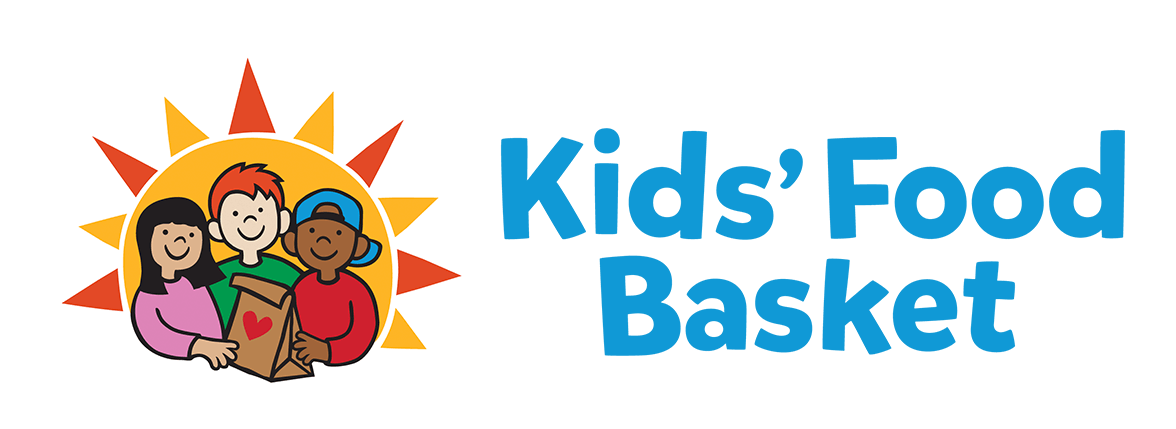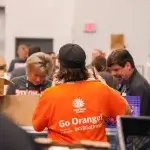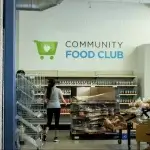
The Community Food Club is committed to being a grocery store for people.
Every member is not just another client, but a customer and part of a collective community.
Since 2015, the Grand Rapids based non-profit has provided low-income families access to healthier eating with a shopping experience that encourages healthy choices by affordable food selection.
This is all done with dignity and innovation.
Members join by paying a small monthly fee that grants them an allotted number of points that translates into a currency to use to shop and buy groceries.
On average, just $13 can feed a family with up to nine to eleven days’ worth of food.
And unlike most grocery stores, the model of the Food Club is that healthy food options cost less compared to unhealthy ones.
Vegetables and fruits are fewer points than potato chips or junk foods, meaning healthy eating habits are being taught even before a member leaves the store.
Inclusivity is another way that the Food Club is honoring its members with a dignified shopping experience.
Each food label is available in English and Spanish, eliminating inequities that many families face in typical grocery store settings.
Learning healthier habits, increasing healthy and affordable food access and eliminating barriers are the keys to how the Community Food Club is improving food insecurity in Kent County.
This is why they are a champion community partner with Kids’ Food Basket (KFB).
In 2018, when Kids’ Food Basket began the first harvest on the 10-acre chemical-free farm, the partnership formed with a shared vision of wanting to get more access of fresh produce out into the community.
“The beauty of the Food Club is that any produce that hits our shelves is going to go, 50% of what our members take every week is fruits and vegetables,” said AJ Fossel, Executive Director of the Community Food Club. “We know that people want access to this type of food, so the partnership with the farm at KFB has been really great.”
 Last year, Kids’ Food Basket harvested over 30 different types of produce.
Last year, Kids’ Food Basket harvested over 30 different types of produce.
Tens of thousands of servings of fresh vegetables and fruits from those harvests, such as broccoli, kale, summer squash and carrots were donated to the Community Food Club.
Meaning that budget restrictions doesn’t need to play a factor in keeping their shelves stocked with good, healthy food.
And stocked shelves, means more members have the option of bringing good, healthy food home to their families.
“Food costs account for 41% of our budget and it’s really important that we pay attention to our spending,” said Fossel. “We would not be able to purchase the beautiful, local produce brought from the KFB Farm. We wouldn’t be able to afford it on a regular basis.”
With the continued repercussions of COVID-19 still impacting a magnitude of people in our community, the need for healthy food and these types of partnerships are more important than ever.
Throughout the pandemic, the Food Club has welcomed scores of people who are struggling with the weight of new challenges that this global crisis has presented.
Specifically, they have seen an increased need in the LatinX population.
“We have witnessed a lot of undocumented families come in because they are not able to benefit from a lot of the government assistance that other families do,” Fossel said. “But we make sure to always have a staff member who is bilingual working because we welcome any person regardless of status.”
There has also been an increase of members who live out of motels, so creating meal options that do not require a stove is a challenge that the Food Club had to solve.
“We called 2020 the year of breaking down barriers,” said Fossel.
“As COVID-19 continues to rear its ugly head, it is worth an important conversation in our community,” Fossel continued. “How do we use food to address some of these issues? People don’t always look at food in economic terms and I think we need to.”
As a charitably funded organization, The Food Club relies on funding from government grants and community donations to survive.
Making partnerships with KFB that more necessary.
With the use of a greenhouse, Kids’ Food Basket has been able to use a hydroponic system as well as a new technique called Dutch buckets, to grow more fresh vegetables throughout the winter months.
Thousands of servings of spinach, lettuce, cherry tomatoes and other types of produce are being donated to the Food Club.
No matter the season, crisis or obstacle, community organizations such as the Community Food Club and Kids’ Food Basket will continue finding ways to get access to healthy food to our neighbors who need it most.
Because working together to care for our most vulnerable is how we will create a stronger and healthier West Michigan.
Fossel said, “It is so important to us that our members have dignity, and they have a choice. I have always appreciated that KFB has understood that from day one. We both have a vision for a very healthy community that encompasses people from all walks of life.”
To learn more about the KFB farm and how to get involved in volunteering and donating fresh produce to community partners, please visit: https://kidsfoodbasket.wpengine.com/what-we-do/our-programs/urban-growing-experiential-learning/



